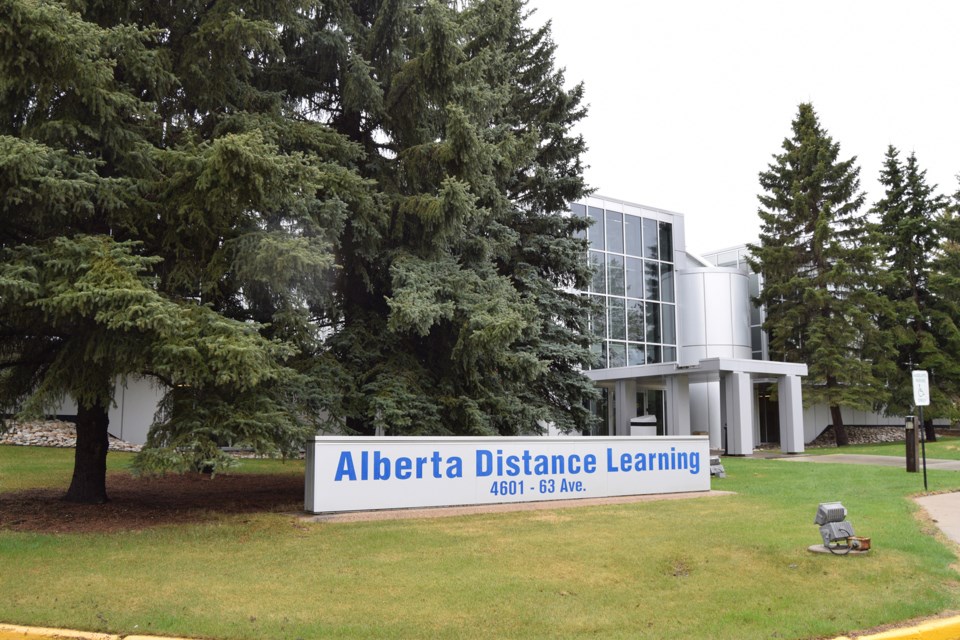The future of the Alberta Distance Learning Centre (ADLC) in Barrhead is looking extremely grim, as the College of Alberta School Superintendents has come out in favour of reducing its funding over the next two years.
And while there’s always the possibility that Alberta Education will have a change of heart, it seems likely that 2020-2021 will be the final year of operation for the ADLC.
“My best guess is that we will be closing at the end of next year,” said Pembina Hills Supt. David Garbutt, in an interview on May 21.
New funding model
Since 1997, Pembina Hills has had a service agreement with the provincial government to operate the ADLC, which is headquartered in Barrhead.
Shortly after the release of the 2020 provincial budget, Pembina Hills learned it was the province’s intention to conclude that agreement in two years. Furthermore, Pembina Hills would only receive $14 million in funding to operate the ADLC in 2020-2021 and $7 million in 2021-2022.
For reference, the 2019-2020 budget of the ADLC totals $18.535 million in revenue and expenses. Approximately $17 million was budgeted to come directly from Alberta Education.
Pembina Hills trustees and staff took part in a teleconference in early March with Alberta Education Minister Adriana LaGrange and other representatives of the province in an effort to impress upon them the importance of the ADLC’s services.
Pembina Hills also provided them the results of a survey conducted amongst distance education facilitators at all 911 schools they work with. A full 46 per cent of respondents said the ADLC’s services were critical to their school’s programming, while 32 per cent said it complemented or completed their programming.
A follow-up meeting with LaGrange was then held on April 22. At that time, the minister’s team indicated they had received feedback from school authority superintendents that school authorities could provide online education services on their own, and that the ADLC was unfairly unfunded.
According to an update posted to the ADLC’s website on May 15, Garbutt said he was invited to make a presentation to the College of Alberta School Superintendents’ (CASS) board of directors on May 8.
However, prior to that meeting, CASS also reached out to all Alberta superintendents via an e-mail and asked for their input. Of the 200-plus superintendents throughout the province, 67 of them sent back responses, and 60 of them were in favour of ceasing funding for the ADLC.
Armed with that consensus, the CASS board of directors made a motion at that May 8 meeting to recommend that the proposed funding model stay in place for the ADLC.
Essentially, this means that the Minister of Education gets to say that they have the support of CASS in switching over to the new funding model, Garbutt said.
The future of ADLC
Garbutt said that it is ultimately the board’s decision whether or not to keep the ADLC in operation, but his position right now is that he will be recommending that the centre shut down at the end of the next school year.
This is because the province has only committed to provide $7 million in funding for the operation of the ADLC in the 2021-2022 school year, which is less than half of the centre’s current operating budget.
“How do we do that? Are we going to let half the staff go? And what would the service levels be like?” he said.
But that still raises a question: what will happen to all the staff currently working at the ADLC? The centre employs a total of 124 staff, the majority of which are based in Barrhead.
On that front, Garbutt pointed out that Pembina Hills has also operated a distance education program called Vista Virtual School since 1996. It has the highest enrolment of any distance education school in Alberta.
During this past year, the operations of the ADLC were restructured so that the functions of the ADLC and Vista Virtual School were separated. Incidentally, this was done at the request of the province, along with a re-structuring of ADLC’s calendar.
However, in light of this news, Garbutt said they may look at merging some services from ADLC into Vista Virtual over the course of the 2020-2021 school year, as well as moving staff into other areas of the division.
Garbutt stressed that these plans are very tentative at this point, but they will do their best.
As for the physical building in Barrhead where the ADLC operates, Garbutt indicated that it is owned by the province, and he has no idea what the province plans to do with it.
However, the seven superintendents who indicated opposition to ADLC’s funding being reduced in the CASS Survey said they wanted to continue using the materials produced by the ADLC, which remain the property of Alberta Education.
Garbutt said he is getting worried calls and e-mails from the smaller schools that relied on ADLC to compliment their programming.
While there are other distance education programs in operation within Alberta, they all require funding to access; ADLC’s services were all free to publicly-funded school divisions, as they were funded almost entirely by the province.



